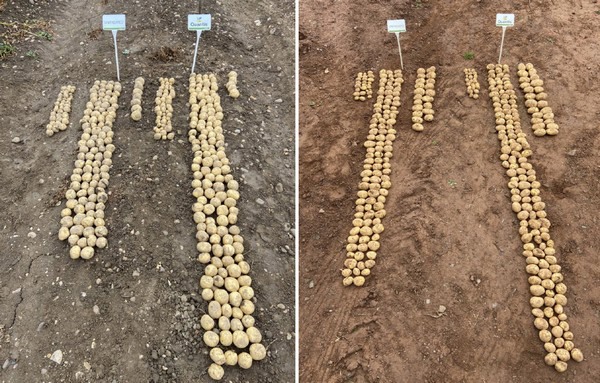Potato crops have paid a heavy penalty as a result of this summer’s record-breaking temperatures and drought across the United Kingdom and Europe. First digs from this year’s Quantis heat-stress biostimulant field trials suggest yields may be over 30% lower in untreated crops.

Across a series of trials from the south-east to the mid-west, marketable yields are on average 24% higher in the Quantis treated areas. The total tuber numbers in marketable size grades have been on average 34% greater in the treated areas, reported Syngenta Technical Manager, Andy Cunningham.
“What appears apparent is that a Quantis application at early tuber initiation has been hugely beneficial in helping plants to set more tubers. Importantly, further applications during periods of heat stress through the growing season has enabled crops to keep growing and produce more marketable yield.”
All the trials yielded so far had received an application at tuber initiation, with two additional treatments during the tuber filling growth stages - at timings when the Quantis Heat Stress Alert tool forecast periods of challenging conditions.
“Quantis research has shown best results can be achieved with applications two to three days prior to onset of heat stress. Nottingham University research has proven that Quantis helps plants to better regulate excess heat and continue to utilise available sunlight,” advised Andy.
Results of irrigated trials in Kent and the midlands were most noticeable in producing the greatest uplift in tuber numbers in the 50-60 mm size category. At Weobley in Herefordshire, the crop of Nectar produced 24% more tubers of marketable size and over 30% higher total tuber weight of marketable grades.
“The results have been remarkable, but not entirely surprising given the season’s temperatures. However, it must be remembered even with consecutive days at 35-38⁰C plus, this season was the hottest summer since 2018. These events are becoming more frequent and more extreme – which growers need to prepare for,” commented Andy.
For further details on how Quantis works and the Quantis Heat Stress Alert tool, visit the Syngenta website www.syngenta.co.uk/quantis
For more information:
Andy Cunningham
Syngenta UK
Tel: 07484 042739
E-mail: andrew.cunningham@syngenta.com
www.syngenta.co.uk/quantis
